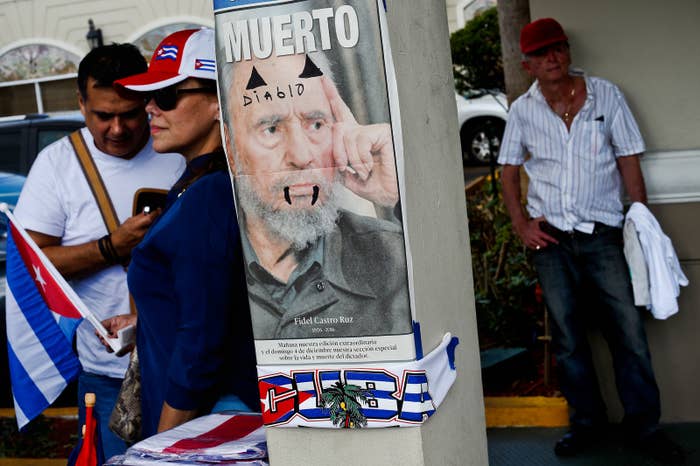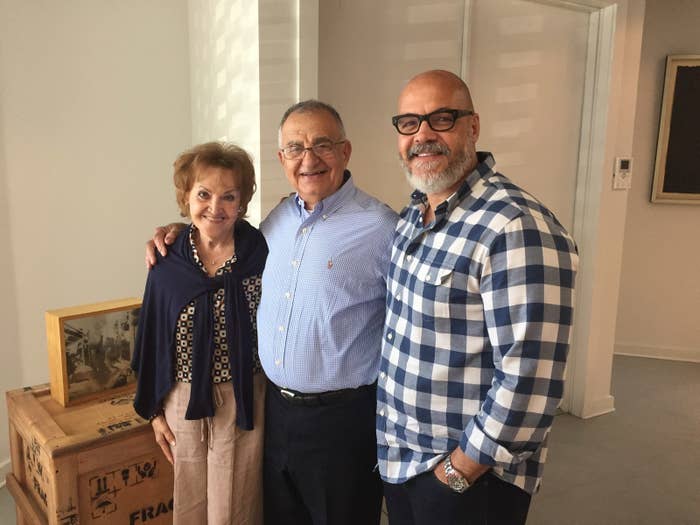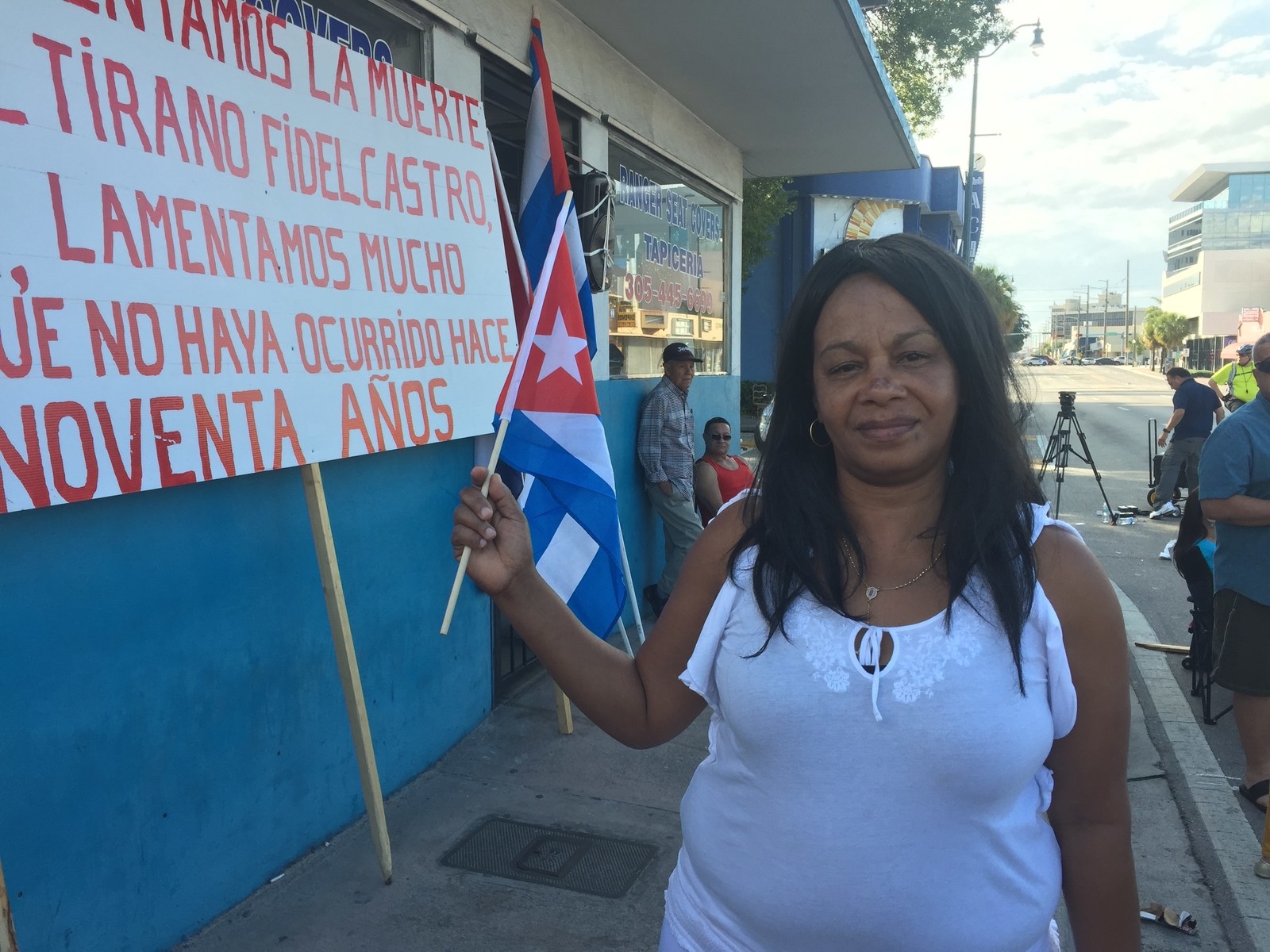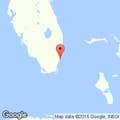
MIAMI — Early on Monday morning, passengers arrived at Miami International Airport to do something no person has done in more than 50 years, boarding a US commercial airline flight bound for the Cuban capital.
After just 45 minutes of flying time, the arrival of American Airlines Flight 17 in Havana was hailed by the Obama administration as an “important milestone in [US] reengagement in Cuba.”
The flight, while a landmark in US–Cuba relations, was overshadowed though by something even more consequential: Friday’s death of Fidel Castro, the strongman who ruled the island nation in one form or another for more than half a century and whose passing now ushers in a new era of uncertainty.
Waving flags and singing songs, hundreds of Cuban-Americans gathered in Miami’s Little Havana neighborhood over the weekend to celebrate the death of a man they had reviled as a dictator. Many told BuzzFeed News that they hoped democracy would now soon come to Cuba. But others were less optimistic, and said they were uncertain that Castro’s death would bring change.
“His death is historic. The head of the snake is missing, but there remains a long tail,” said Guillermo Raul Hernandez, an 80-year-old Cuban exile living in Miami. “This change the majority of people have been waiting for isn’t going to happen in days, because the Cuban government has dedicated more than 50 years to its current system.”
He once spent three days and two nights in jail when he bought more milk than his ration allowed because his son had a calcium deficiency. Thankfully some friends who worked for the government spoke with a judge and he only had to pay a fine, Hernandez said.
Hernandez came to the US in 1967 with his wife and then-5-year-old son after witnessing the rise of Castro. He said he knows first hand the stranglehold communism has on Cuba.
“It’s going to be more of the same,” Hernandez said. “Whatever changes are brought about, I think they need to bubble up from within Cuba. There’s not very much we could do from here.”

Florida International University Professor Eduardo Gamarra, an expert in the regional dynamics of Latin America, said Cuba’s government has been planning for a future without Castro for some time, evident in Raúl Castro taking over his older brother’s position in 2008.
The Cuban government remains in control and dissenters on the island are easily stifled, Gamarra said.
“I don’t think there’s going to be turmoil and tension and collapse,” Gamarra said. “The greatest transition is on the economic side.”
The death of the Cold War icon comes after two years of massive economic and diplomatic upheaval between Cuba and the US.
In April 2015, President Obama and Raúl Castro met on the sidelines of the Summit of the Americas in Panama, the first meeting between US and Cuban heads of state since diplomatic ties were severed in 1961. Then in March, Obama traveled to Havana and gave an address outlining the gradual end of the US trade embargo, while also pushing for political reforms. "Even if we lifted the embargo tomorrow,” he said, “Cubans would not realize their potential without continued change here in Cuba."
But even before Castro's death, the fragile relationship between the two countries was threatened with change by the incoming administration of Donald Trump, who has called Fidel Castro a “brutal dictator.”
On Monday, Trump threatened to terminate the new ties between the two countries. “If Cuba is unwilling to make a better deal for the Cuban people, the Cuban/American people and the U.S. as a whole, I will terminate deal,” he tweeted. He gave no other specifics.
Gamarra, the FIU professor, said Trump’s administration could undo the newly established relations, push for the embargo to remain, or end the Cuban Adjustment Act, a federal law that allows Cubans to apply for residency.
“He could do that, but the question is will he do that?” Gamarra said. “It’s unlikely anybody will do anything in the spur of the moment. It just doesn’t happen that way. Even with Trump’s bravado, they would have a very difficult time.”

The renewed US relations with Cuba have been controversial and hurtful for many Cuban-Americans.
At Sunday’s celebrations in Little Havana, Yaquelin Boni told BuzzFeed News many in her community had felt deceived and confused as to why the US would deal with a country they had called an enemy for decades.
But Boni, a Cuban exile who joined the activist group Ladies in White following the jailing of her son, was praying that Castro’s death might open the door to change in her homeland.
“They may not know what human rights and liberty is, but they know they are hungry and in pain,” Boni said. “They’re disenchanted and this is the moment that a crucial change can come.”
Tony Hernandez, the son of Guillermo Raul Hernandez who came to the US when he was 5, was not as hopeful.
He said his family still had the telephone number they were given when they came to the US and told to call when Castro’s government collapsed and they were ready to go back.
“That change may come over time, but ... the day Cubans can return to the homes they left is a pipe dream,” Hernandez said. “That has got to be the most lonesome phone number in the world waiting to ring.”

